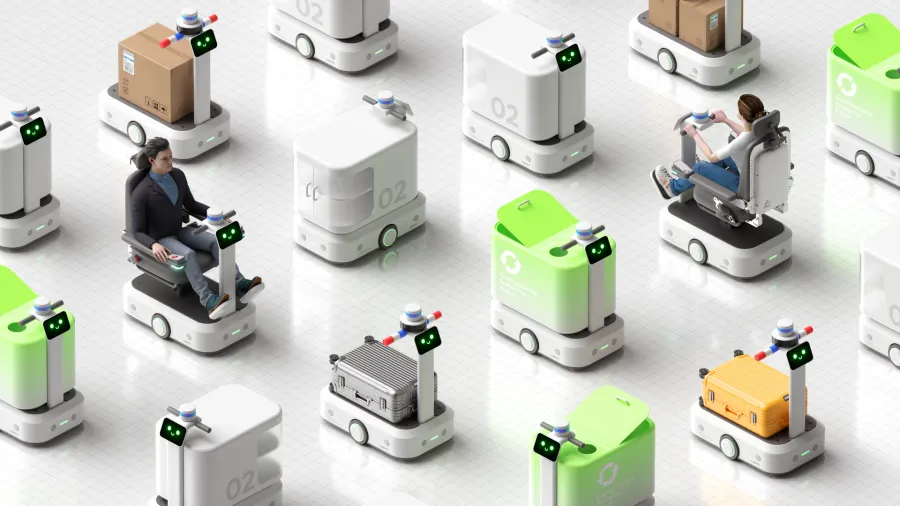
Libpet defines smart mobility with robotic wheelchairs and home control systems
Mobility tech for the physically challenged also offers convenience to the young and able-bodied.
In a world where convenience is king, Hong Kong-based health tech start-up Libpet is into designing smart robot wheelchairs not just for the physically challenged but for everyone. Through innovation, its inclusive device for mobility and productivity helps minimise physical effort, making life so much easier.
“Libpet is a healthcare robotic company [developing] the smart robot and the smart house manager system for the elderly,” Jojo Xu, CEO and co-founder of Libpet, told Hong Kong Business.
But its product is not only for those in need of augmenting their physical limitations to get about. Mobility and repetitive movement can also be a common pain point for many active bodies.
“There [is so much] energy [being] wasted. So, we want to develop a smart system,” Xu said, noting how Libpet is transforming smart mobility with its innovative wheelchairs.
Their product boasts advanced features like stair-climbing capabilities and autonomous driving systems. Also, the start-up offers innovative smart home technology like the GoX, a robot designed for chores such as vacuuming and mowing.
“I co-founded this company with some of my batch friends, and we feel that the aging population will be very serious in the next 10 [to] 20 years. So we said, ‘Why [don’t] we just turn the autonomous driving technologies and robotic technology into a wheelchair?’ And we can co-found a robotic company” Xu recalled.
High-tech mobility
Libpet’s high-tech wheelchair comes in three versions: Libpet Power, Libpet Mini, and Libpet Air. These models each have varying features such as ground and obstacle clearance, adjustable components, smart controls, and an ultrasonic anti-collision system. All functions can be managed via the Libpet App on any phone or tablet.
“Libpet offers three variations: the Power, Air, and Mini. While they might seem like different products, they are essentially the same, made up of interchangeable components. For example, the chair is one component that can be adjusted and customised. Another key part is the base, which we call the base display. It runs on regular roads, has autonomous driving capabilities, and can even navigate stairs,” Xu explained.
Each of these smart wheelchairs offer practical and flexible upgrade options. “If you purchase one version, like the Mini, you can upgrade to the Power or Air by adding or swapping components. This modular approach saves you money and offers flexibility,” said Xu.
“Additionally, the smart home system can control various aspects of your environment, from your dog to home lighting, enhancing energy efficiency and convenience,” he said.
It integrates seamlessly with various components to control aspects such as pets, the home environment, and smart lighting whilst offering autonomous driving functions to help save energy.
“So, the smart wheelchair, we can sell it to [physically challenged] people, as well as to young people because it’s not only the physically challenged, such as the elderly or wheelchair users, who need this kind of product, but also young people who might want a stylish scooter to help them get to work or back home. For this reason, we can either sell or rent the smart wheelchair to them,” Xu said.
As for the smart house manager system, he believes it can be widely used in elderly care facilities and building management teams.
Libpet has already partnered with distributors, including hospitals and scooter retailers, to market these products.
Future advancements
Libpet’s unique and revolutionary idea came to fruition when AIA Hong Kong recognised that it aligned with its mission: to help the people. This idea earned them a spot amongst the bright minds to win and share $5m funding from the AIA Creator Fund.
“They were impressed by our vision of a wheelchair not just as a mobility device but as a robot. Our innovative design persuaded them that wheelchairs could be used by everyone, not just the physically challenged. This represents a revolution in the wheelchair market,” he said.
“With the funding, we plan to enhance our [R&D] to improve functionality and reduce manufacturing costs. We also aim to hire more physically challenged individuals to join our team, as they can provide valuable feedback on the wheelchairs. Finally, we intend to use these funds to test the stair-climbing wheelchairs in real-world scenarios to better assist those in need,” he added.
Aside from the funding, Libpet maneuvers through the scene with personal resources from its founders and government grants. With this money, the startup aims to explore new product lines to make their wheelchairs more comfortable and appealing to young people.
“At Libpet, our primary focus is on identifying what products customers need and addressing their pain points. Our goal is to provide solutions that solve these pain points at attractive prices. Our vision for the company is to make great things happen by encouraging each team member to make great improvements every day. By continuously enhancing our products, we believe we can achieve significant advancements,” Xu concluded.



















 Advertise
Advertise






